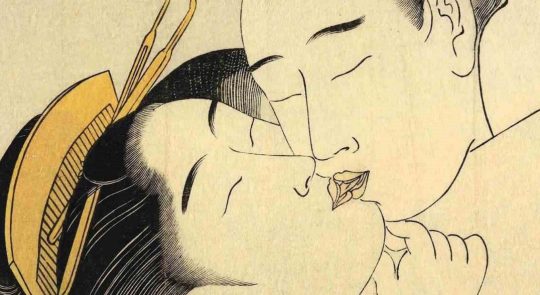Video
youtube
Jean Painlevé´s ¨The Love Life of the Octopus¨, 1967
4 notes
·
View notes
Photo

Oleg Kulik, “Family of the Future”, 1997
10 notes
·
View notes
Text
In times of crisis, we must all decide again and again whom we love.
Frank O'Hara
15 notes
·
View notes
Link
Not only can they not participate in society, often unable to work for long periods, or to be charming, or to smell nice, and so on, but they are an implicit critique of the infrastructure of working, the charms and nice smells with which people survive the painful world. So loving a crazy person forces you beyond all conventional measurements of worth or meaning. That is why it often falls to women, who live partly outside measure, and often drives them crazy too.
306 notes
·
View notes
Text
The body in pain is a deviant body that defies expectations, refuses the easy boxes of sick and well. I am trying to figure out how to love a body in pain, or feel desire with a body in pain. The fibers of my muscles ache, and the muscles supporting the joints tense up around the pain. My skin often feels like it is burning, and that is not merely skin as symptom. That is the same skin that welcomes or repels touch. I have only one body to use, inside the doctor’s office and out. My body remembers old embraces, skin-to-skin contact from before as well as now. Now there is a barrier between myself and other bodies: this pain.
Desire is a different substance now, a process requiring attention and effort. It is no longer a thoughtless release. Pain sex is queer sex, strange sex, wrong sex. Even in the comfort of a therapist’s office, the assumption is that everyone must be having sex and must produce the requisite amount of desire. I have been encouraged and maybe even shamed a bit to get up to a normal level of sexual production because “sex is good.” I agree with this, and it is important to feel connected to my partner in this way, but sex and desire are very complicated for people whose central nervous systems scream at them. Sex is a complex and fraught dance, an intellectually draining circus to run. After I manage to have sex, I often collapse for a few days from the effort of being in my body and sorting the signals of pain and desire. Yet I am continually pushed to conform. It’s not that I don’t want to have sex; it’s that my partner and I are in the midst of tentatively creating what sex looks like for someone with chronic pain and her partner, and I don’t see this image of desire anywhere—not in movies, not in what I read. As Lazy Rane writes on the blog Guerrilla Feminism: Global and Intersectional, “I believe that a body in pain, is a body which is particularly hard to love, and scarily easy to hate. What is worse, the pain can make this hatred of your own body seem not only reasonable, but inescapable, so blatant in its normality that it can take a long time to challenge your own feelings.” Desire and love have to grapple first with reconstituting themselves in a body that has been altered to its core.
Sonya Huber, “Pain Woman Takes Your Keys and Other Essays from a Nervous System”
67 notes
·
View notes
Link

Ania Nowak, Can You Die of a Broken Heart? August 30–October 7, 2018
7 notes
·
View notes
Link

"On an individual level, it provides me with an emotional sense of reparations."
2 notes
·
View notes
Link

We looked at 168 cultures and found couples kissing in only 46 percent of them. Societies with distinct social classes are usually kissers; societies with fewer or no social classes, like hunter-gatherer communities, are usually not. For some, kissing seems unpleasant, unclean, or just plain weird. Kissing is clearly a culturally variable display of affection.
13 notes
·
View notes
Link
Yet brutal candour is required, says Augustine Brown, if mothers are ever to be seen as independent of their children. And this is where the subject of regret introduces a radical new twist in the mother plot: It introduces the notion that mothers can exist autonomously from their children.
62 notes
·
View notes
Link

The trigger for the syndrome – also called stress cardiomyopathy or Takotsubo cardiomyopathy – is the body's sudden, massive release of adrenaline, which can "stun" the bottom half of the main pumping chamber of the heart, in effect paralysing it and requiring the top portion of the chamber to work much harder to compensate.
[...]
About 90% of diagnosed broken heart syndrome cases are in post-menopausal women – which begs the question, why aren't men getting it? Lyon suggests that men may in fact be suffering from the condition – but collapse and die before reaching hospital and medical attention.
5 notes
·
View notes
Link
Freedom was once inseparable from interdependence, close ties, and kinship: I am free because of others I can depend on. Today, freedom tends to mean something different. It is about being unconstrained and having options. Look for the dictionary definition of freedom today and one finds rights and choices at the core, applied to an isolated individual.
[...]
Relational freedom necessarily includes undoing destructive relationships, dissolving or attacking depleting or harmful forces. Freedom is the capacity to make friends and enemies, to be open and to have firm boundaries. In this sense, the dominant order destroys our capacity to identify and attack that which depletes and destroys us: morality, policing, law, and prisons are all designed to monopolize the power to decide what is right and wrong, and how to respond to it.
Meaningful change comes from finding wiggle room to work on each other and our situations. It might entail supporting each other to become more present with despair, guilt, resentment, fear, anger, or grief. It might include channeling rage into blocking oppressive or extractive relationships, or blocking their flows, at least in part.
2K notes
·
View notes
Text
“There is nothing more vulnerable than caring for someone; it means not only giving your energy to that which is not you but also caring for that which is beyond or outside your control. Caring is anxious—to be full of care, to be careful, is to take care of things by becoming anxious about their future, where the future is embodied in the fragility of an object whose persistence matters. Becoming caring is not about becoming good or nice: people who have “being caring” as their ego ideal often act in quite uncaring ways in order to protect their good image of themselves. To care is not about letting an object go but holding on to an object by letting oneself go, giving oneself over to something that is not one’s own.”
Sara Ahmed, “The Promise of Happiness”
2K notes
·
View notes
Link
“It is contradictory feature of bourgeois ideology that effort gets causally associated with power precisely in a society premised on the opposite: power derives from the exploitation and appropriation of others’ activeness. It’s remarkable how quickly this supposed link between power and effort is forgotten where blowjobs are concerned… but that’s beside the point. What concerns me here is that this direct link exists between penetrating and power. That’s what has to go.
[…]
Technical as well as colloquial language tends to narrow penetration down to mean practices involving vaginas, anuses, penises, and dildos. Finger-in-butt and nipple-in-mouth play are often not referred to as penetrative sex. The word “circlusion” does not have to share this narrowness. On the contrary, it could cheerfully refer to the activity of a closed hand around a dildo, or of a vagina stretched over a fist, alike, as the act of “circluding.” But it doesn’t have to serve us in this way. Since the meaning of a sign is only ever determined through its use, “circlusion” could equally take the place that “penetration” has hitherto occupied in culture, just without conjuring images that interfere so negatively with people actually having sex.”
4 notes
·
View notes
Text
“The love expressed between women is particular and powerful, because we have had to love in order to live; love has been our survival.”
Audre Lorde
6 notes
·
View notes


